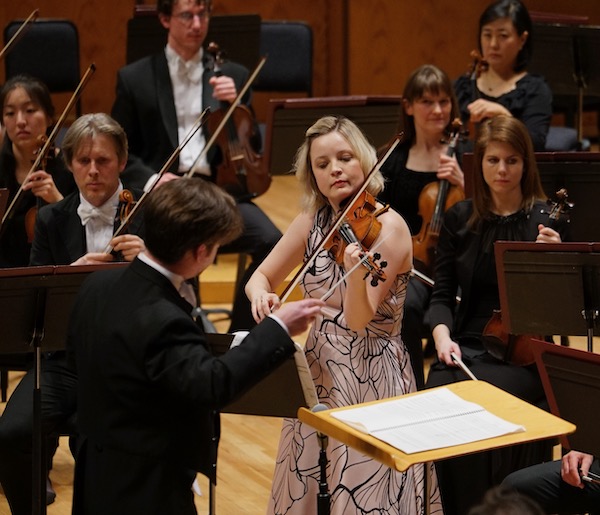Utah Symphony opens 2020 with a scintillating mix

The Utah Symphony opened the new year with a textured and scintillating journey through centuries and countries, expertly guided by associate conductor Conner Gray Covington Friday night at Abravanel Hall.
2020 marks the 250th anniversary of Ludwig van Beethoven’s birth, and the program began with his Leonore Overture No. 3.
Written for the composer’s sole opera Fidelio, the overture reflects the narrative of a prisoner’s reprieve, moving from trepidation to hope to relief and joy. The slicing sounds of the violins evoked a sense of force and conflict. The off-stage trumpeter, beautifully performed from the balcony by principal Travis Peterson, shifts the feeling of uncertainty to one of possibility.
It was wonderful to listen to how eloquently this orchestra can convey a story through music. Covington’s alert modulation of volume and balancing infused Beethoven’s oft-played piece with excitement and vibrancy. The orchestra’s violin sections—exceptional all night—evoked the overture’s diversity of moods and colors.
That versatility was especially apparent in the evening’s centerpiece, Edgar Meyer’s Violin Concerto, which featured Kathryn Eberle, the Utah Symphony’s associate concertmaster.
Cast in two movements, the concerto reflects Meyer’s upbringing in Tennessee and blends traditional classical style with his knowledge of bluegrass music—as both a double-bass player and composer.
Meyer wrote in the program note for the 1999 recording, that he “conceived this violin concerto with Hilary Hahn’s singular voice in mind,” yet Eberle’s powerful performance showcased her own impressive artistry. She played Meyer’s distinct and lush phrases with pliant sensitivity and one savored the dialogic quality of the composition, with the violinist underlining the score’s intimate, conversational qualities.
Covington’s conducting enhanced the fascinating contrasts between the driving orchestra rhythms of Meyer’s concerto and Eberle’s terrific solo playing.
After intermission, Arlene Sierra’s Moler was heard in its Utah Symphony premiere. Commissioned by the Seattle Symphony, the work debuted in 2012, and was nominated for a Latin Grammy Award in 2014. Its title can be translated as the verb “to grind” and Sierra has described her inspiration for the piece as “bruxism,” which literally means teeth-grinding.
The orchestra brought a deep commitment to its ominous, anxious, and suspenseful moods. The uneasy tensions in this composition conjured thoughts of indeterminacy and unpredictability, not only in individuals but also in environments, as seen currently in the fires raging in Australia.
Sierra’s work culminated in a dramatic abrupt halt, setting up an intriguing contrast with Debussy’s La Mer, which followed to close the evening.
Writing about La Mer, scholar Caroline Potter has described it as “musical onomatopoeia,” something that musicians of the Utah Symphony made wonderfully clear. There were swells, ebbs, flows, crests, and troughs. During the second section, “Play of the Waves,” the harpists evoked a sense of descending streams.
The third section, “Dialogue of Wind and Sea,” steadily built from growing agitation to invigorating force. The horn section was especially vibrant and clear. At the close of the piece, most of the audience rose for a standing ovation.
As the applause continued, Covington took to the microphone to announce two encores marking the New Year, an ode to watching the Vienna Philharmonic over the holidays, he said. Both were by Johann Strauss II: the Hunting Polka and the Champagne Polka. The latter featured a clever instrument, played by percussionist Eric Hopkins, that replicated the sound of a bottle of bubbly being opened.
When this instrument exploded mid-performance, there was a moment of improvisation, and then an exciting finale with gold streamers flying onto the stage from the wings, accompanied by the polka’s final notes. The choice of Strauss was celebratory and apt, again highlighting the versatility of this orchestra and providing a fun and exuberant start to the Utah Symphony’s new year.
The program will be repeated 7:30 p.m. Saturday in Abravanel Hall. utahsymphony.org; 801-533-6683.